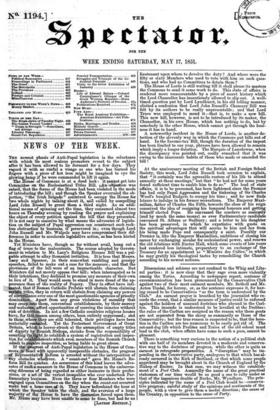NEWS OF THE WEEK.
TirE newest phasis of Anti-Papal legislation is the reluctance with which its most zealous promoters revert to the subject after it has been allowed to lie dormant for a few days. They regard it with as rueful a visage as one who has burned his fingers with a piece of hot iron might be imagined to eye the glowing, lump if he were commanded to lift it again.
The House of Commons is at a dead lock: it cannot get into Committee on the Ecclesiastical Titles Bill. .;..iin,.objeotion was raised, that the forms of the House had been violated in the mode of introducing the bill ; and though the Speaker overruled the ob- ection, "the Irish Brigade " contrived to occupy the House for Iwo whole nights by talking about it, ana ended by compelling Lord John Russell to grant them a third night. As an addi- tional means of spinning out the time, they consumed almost two hours on Thursday evening by reading the prayer and explaining the object of every petition against the bill that they presented. It is not easy to conceive by what means the advocates of legisla- tion on the subject of Papal aggression can counteract such reck- less obstruction to business, if persevered in ; even though Lord John Russell and Mr. Walpole may have compromised their dif- ferences in order to accelerate legislative action, as has been hinted in the House.
Yet Ministers have, though so far without avail, hung out a flag of truce to the malcontents. The course adopted by Govern- ment in relation to Mr. Lacy's Religious Houses Bill was a pal- pable attempt to allay Romanist irritation. It is true that Messrs. Lacy ai.d Spooner, in their somewhat rambling and gossipy speeches, failed to make out a case for the measure ; and that the provisions of the bill were of an impracticable character. But Ministers did not merely oppose that bill ; when interrogated as to their intentions, they declined to promise any measure of their own in lieu of it. They would seem to stand in more dread of the ap- pearance than of the reality of Popery. They in effect have inti- 'mated, that if Roman Catholic Prelates will abstain from claiming earflrea„titles, they in return will abstain from claiming any powers of sukefllance over one of the most questionable agencies of priestly domination. Apart from any gross violations of morality that may creepinto them, conventual establishments, by their secrecy and,seclusbm; afford opportunities of coercing the inmates without risk of detebtion. In not a few Catholic countries religious houses have, for thiikriason among others, been entirely suppressed; and in thoie.,where-they are still tolerated, their privileges have been materially curtailed. Yet the Protestant Government of Great Britain, which is horror-struck at the assumption of empty titles of dignity by4tonaish Bishops, shrinks from the responsibility of asserting -itsAiht,to establish a system of registration and inspec- tion for es ,-M,Ments which even members of the Romish Church admit to acquire inspection, as being liable to great abuse.
If &a–progress of Anti-Papal legislation in the House of Cora- 1
mons 13Cbeset h apparently insuperable obstacles, the progress sf Reioresentati Reform is arrested without the interposition of any obstacles w .afever. A " count-out " gave Mr. Hume's Re- form Bill its quietus.. An occurrence of this kind leaves the advo- cates of siieli ameasure in the House of Commons in the embarras- sing dilemma of being regarded as either insincere in their profes- sions, or a set of the veriest incapables who ever undertook Par- liamentary business. Even the three or four Members who were engaged upon Committees on the day when the count-out occurred make but a lame case 4, it. They knew beforehand the hour at which the Speaker takes The chair, and the aversion of a large majority of the House to have the discussion forced upon them. Mr. Hume may have been unable to,00me to time, but had he no
lieutenant upon whom to devolve the duty ? And where were the fifty or sixty Members who used to vote with him on such ques- tions, and who had no Committees to detain them ?
The House of Lords is still waiting till it shall please its masters the Commons to send it some work to do. This state of affairs is rendered more unaccountable by a piece of secret history which the Lord Chancellor has incautiously allowed to slip out. A well- timed question put by Lord Lyndhurst, in his old telling manner, elicited a confession that Lord John Russell's Chancery Bill was felt by its authors to be really unpresentable ; and that Lord Truro was employed to mend it—that is, to make a new bill. This new bill, however, is not to be introduced by its mike; the Chancellor, in his own House, which has nothing to do, but by somebody in the other House, which cannot get through the busi- ness it has in hand.
A noteworthy incident in the House of Lords, is another de- tection of the slovenly way in which the Commons put bills out of hand. In the Income-tax Bill, though the duration of the impost has been limited to one year, phrases have been allowed to remain which imply a longer duration. The Marquis of Lansdowne, when the discrepancy was pointed out, coolly remarked that it was owing to the inaccurate habits of those who made or amended the bill


























